英汉语言对比与翻译2
- 格式:wps
- 大小:156.60 KB
- 文档页数:4

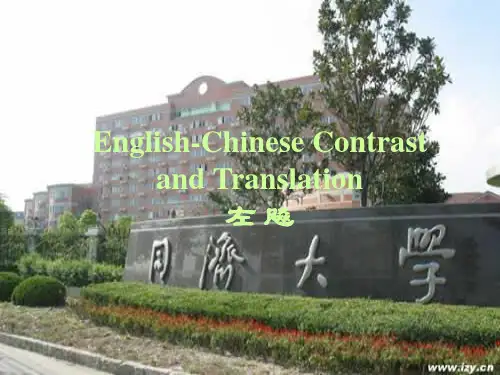
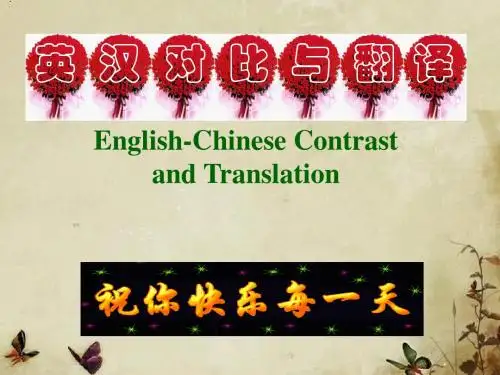
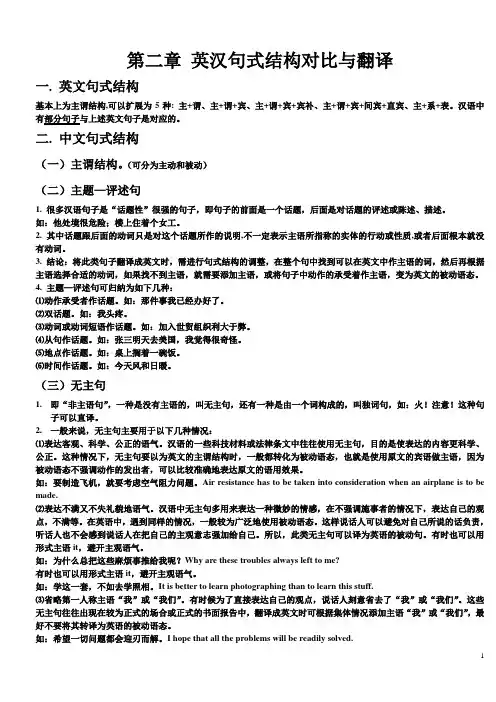
第二章英汉句式结构对比与翻译一. 英文句式结构基本上为主谓结构,可以扩展为5种: 主+谓、主+谓+宾、主+谓+宾+宾补、主+谓+宾+间宾+直宾、主+系+表。
汉语中有部分句子与上述英文句子是对应的。
二. 中文句式结构(一)主谓结构。
(可分为主动和被动)(二)主题—评述句1. 很多汉语句子是“话题性”很强的句子,即句子的前面是一个话题,后面是对话题的评述或陈述、描述。
如:他处境很危险;楼上住着个女工。
2. 其中话题跟后面的动词只是对这个话题所作的说明,不一定表示主语所指称的实体的行动或性质,或者后面根本就没有动词。
3. 结论:将此类句子翻译成英文时,需进行句式结构的调整,在整个句中找到可以在英文中作主语的词,然后再根据主语选择合适的动词,如果找不到主语,就需要添加主语,或将句子中动作的承受着作主语,变为英文的被动语态。
4. 主题—评述句可归纳为如下几种:⑴动作承受者作话题。
如:那件事我已经办好了。
⑵双话题。
如:我头疼。
⑶动词或动词短语作话题。
如:加入世贸组织利大于弊。
⑷从句作话题。
如:张三明天去美国,我觉得很奇怪。
⑸地点作话题。
如:桌上搁着一碗饭。
⑹时间作话题。
如:今天风和日暖。
(三)无主句1.即“非主语句”,一种是没有主语的,叫无主句,还有一种是由一个词构成的,叫独词句,如:火!注意!这种句子可以直译。
2.一般来说,无主句主要用于以下几种情况:⑴表达客观、科学、公正的语气。
汉语的一些科技材料或法律条文中往往使用无主句,目的是使表达的内容更科学、公正。
这种情况下,无主句要以为英文的主谓结构时,一般都转化为被动语态,也就是使用原文的宾语做主语,因为被动语态不强调动作的发出者,可以比较准确地表达原文的语用效果。
如:要制造飞机,就要考虑空气阻力问题。
Air resistance has to be taken into consideration when an airplane is to be made.⑵表达不满又不失礼貌地语气。
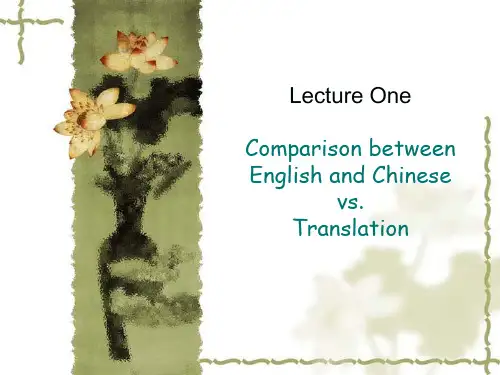
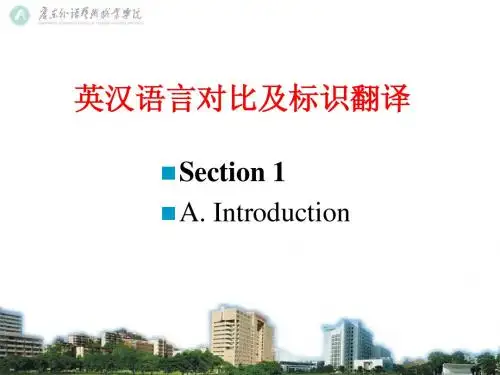
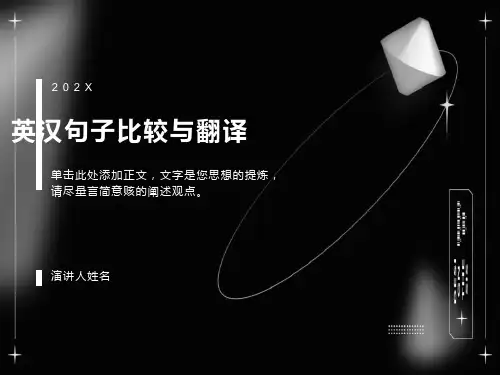
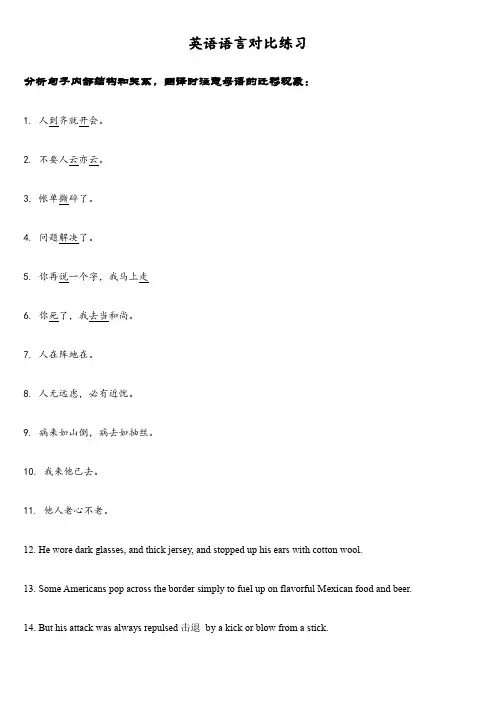
英语语言对比练习分析句子内部结构和关系,翻译时注意母语的迁移现象:1. 人到齐就开会。
2.不要人云亦云。
3. 帐单撕碎了。
4. 问题解决了。
5.你再说一个字,我马上走6. 你死了,我去当和尚。
7. 人在阵地在。
8. 人无远虑,必有近忧。
9. 病来如山倒,病去如抽丝。
10. 我来他已去。
11. 他人老心不老。
12. He wore dark glasses, and thick jersey, and stopped up his ears with cotton wool.13. Some Americans pop across the border simply to fuel up on flavorful Mexican food and beer.14. But his attack was always repulsed击退by a kick or blow from a stick.15. Kino hurrying towards to his house, felt a surge of exhilaration.分析观察汉语的句式并翻译:1. 他决定去拉车,/就拉车去了。
/赁了辆破车,/他先练练腿。
/第一天没拉着什么钱。
/第二天的生意不错,/可是躺了两天,/他的脚脖子肿得像两条瓠子似的,/再也抬不起来。
2. 原来这婆娘自从药死武大,/哪那里肯带孝,/每日只是浓妆艳抹,/和西门庆作一处取乐。
/听得武松叫声“武二归来了”,/慌忙去面盆里洗落了脂粉,/剥去了首饰钗环,/蓬松挽了个髻,/脱去了红裙绣袄,/旋穿上孝群孝衫,/便从楼上哽哽咽咽假哭下来。
//3. 武松沉吟了半晌,/便出门去,/径投县里来;/开了锁,/去房里换了一身素净衣服,/便叫士兵打了一条麻绦,/系在腰里;/身边藏了一把尖长柄短背厚刃薄的解腕刀,/取了些银两带在身边。
翻译时注意英汉两种语言之间修饰语的差异:•姑娘•北京姑娘•漂亮的北京姑娘•年轻漂亮的北京姑娘•身材苗条年轻漂亮的北京姑娘•两个身材苗条年轻漂亮的北京姑娘•正看着我们的两个身材苗条年轻漂亮的北京姑娘正面带笑容看着我们的两个身材苗条年轻漂亮的北京姑娘翻译下面句子,注意英汉两种语言形合与意合的差异:5.All was cleared up some time later when news came from a distant place that an earthquake was felt the very day the little copper ball fell.6.When I try to understand what it is that prevents so many Americans from being as happy as one might expect, it seems to me that there are two causes, of which one goes much deeper than the other.7. It has been a fine, golden autumn, a lovely farewell to those who would close their youth, and some of them their lives, before the leaves turned again in a peacetime fall.8. The many colors of a rainbow range from red on the outside to violet on the inside.9. He had a disconcerting habit of expressing contradictory ideas in rapid succession.10. Power can be transmitted over a great distance with practically negligible loss if it is carried by an electric current.11. The present onslaught猛攻/猛击of vehicles poses a serious threat to urban life and pedestrian peace of mind.12.He boasts that a slave is free the moment his feet touch British soil and he sells the children of the poor at six years of age to work under the lash in the factories for sixteen hours a day.13.They would have had to live the rest of their lives under the stigma耻辱/瑕疵that they had recklessly precipitated an action which wrecked the Summit Conference and conceivably could have launched a nuclear war.14. Could any spectacle, for instance, be more grimly可怕whimsical荒谬than that of gunners using science to shatter men’s bodies while, cl ose at hand, surgeons use it to restore them?15. There is nothing more disappointing to a hostess who has gone to a lot of trouble or expense than to have her guest so interested in talking politics or business with her husband that he fails to notice the flavor of the coffee, the lightness of the cake, or the attractiveness of the house, which may be her chief interest and pride.1.说是说了,没有结果。
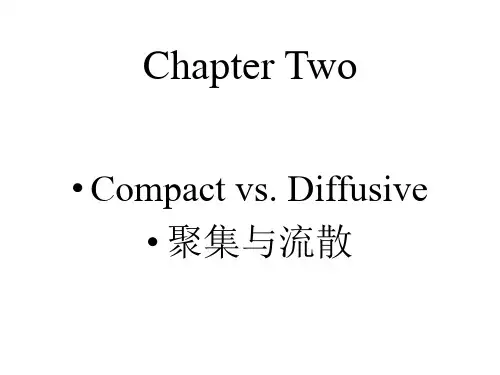
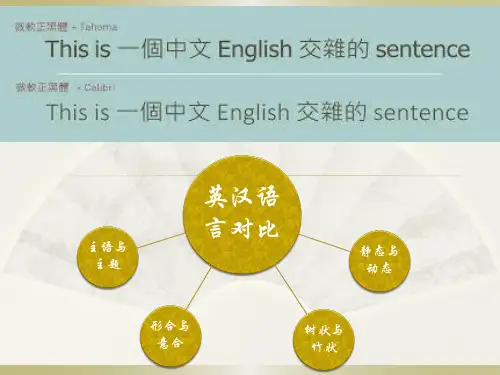
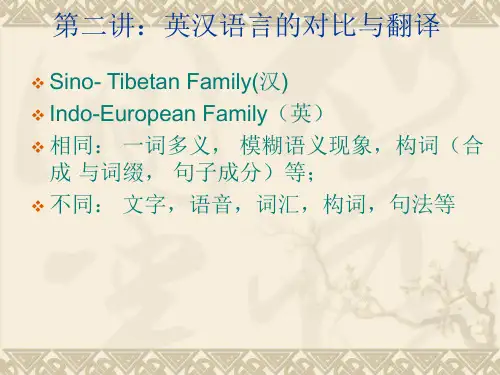
1.翻译下列句子,注意调整语序1)A reader’s perception of the loose, slangy, colloquial, shirt-sleeved quality of much modern prose will be sharpened if he has experienced the conscious elegance of eighteenth-century writers and the solemn lecture-hall pronouncements of the Victorians. (按照逻辑顺序译)【译文】如果一位读者读过18世纪作家的作品,体会到其刻意追求典雅的语言风格,又读过维多利亚女王时代的人在演讲大厅上所作的庄严的发言,他定能更深刻地理解很多现代散文作品那种结构松散、口语色彩浓、好用俚语、不拘形式的语言风格。
2)He felt a qualm in his stomach, and it was more in memory of his own loneliness than anticipation of hers.(按照信息中心译)【译文】他感到一阵心酸,与其说是预见了她的凄凉,倒不如说是想到了他自己的孤独。
3)Based on national realities and taking reasonable aspects of foreign economies, Chinese economists are working to establish socialist market economy, which ensures economic activities follow the requirements of the law of value and the changing relationship between supply and demand. (按照搭配需要译)【译文】在立足本国实际和借鉴海外经济合理成分的基础上,中国经济学者正致力于建立社会主义市场经济,要保证经济活动遵循价值规律的要求,适应供求关系的变化。
英汉词语对比与翻译--- 系统、语义及其他词类在英汉语中使用的频率有差异1.我成功了。
I was in success.2. The old man cast impatient glances at the clock. 这位老师不耐烦地看了看钟。
3.他初出茅庐,没有什么经验。
He is a green hand4. On entering the door I remembered the doll I had broken. I felt my way to the hearth and picked up the pieces. I tried vainly to put them together.一进门,我就想起来了被我摔碎的娃娃。
我摸索着走到壁炉跟前,捡起了碎片。
A Contrastive Study of English and Chinese --- 英汉语对比研究人到齐就开会。
The meeting will begin when all are here. 不要人云亦云。
Don’t say what others have said.帐单撕碎了。
The bill was torn to pieces. 问题解决了。
The problem was solved.你再说一个字,我马上走。
If you should say one more word, I would go at once. 你死了,我去当和尚。
If you should die, I would go and be a monk.1.人在阵地在。
The position will not be given up so long as we are still living.(Condition 条件)2.人无远虑,必有近忧。
If one has no long-term considerations, he will find trouble at his doorstep.(Condition 条件)3.病来如山倒,病去如抽丝。
幻灯片1
课后练习
●blue films
●bluebottle
●Greenfly
●common criminal
●common informer
●hard labor
●free love
●blue-eyed boy
●bluestocking
幻灯片2
参考翻译
●blue films 蓝色电影(×)
●淫秽电影(√)
●bluebottle 蓝瓶子(×)
●绿头苍蝇(√)
●greenfly 绿苍蝇(×)
●蚜虫(√)
●common criminal 普通罪犯(×)
●臭名昭著的罪犯(√)
●common informer 一般的告密者(×)
●职业告密者(√)
幻灯片3
参考翻译
●hard labor 艰苦的劳动(×)
●(监禁)苦役(√)
●free love 自由恋爱(×)
●(无婚约的)自由性爱(√)
●blue-eyed boy 蓝眼睛男孩(×)
●宠儿(√)
●blue sky research/thinking 蓝天研究/思维(×)
●天马行空式的(√)
幻灯片4
翻译的原则与标准
1. 支谦与《法句经序》(229年)
“天竺言语,与汉异音。
云其书为天书,语为天语,名物不同,传实不易。
”
开篇即强调了佛经翻译之难,即语言不同,语境不同,名物不同,翻译起来确实不易。
幻灯片5
翻译的原则与标准
2. 道安与“五失本,三不易”
源自其在公元382年所作
《摩诃钵罗若波罗蜜经抄序》
译胡为秦,有五失本也。
一者,胡语尽倒,而使从秦,一失本也。
二者,胡经尚质,秦人好文,传可众心,非文不合,斯二失本也。
幻灯片6
翻译的原则与标准
三者,经委悉,至于叹咏,叮咛反复,或三或四,不嫌其烦,而今裁斥,三失本也。
四者,胡有义说,正似乱辞,寻说向语,文无以异,或千五百,刈而不存,四失本也。
五者,事已全成,将更傍及,反腾前辞,已乃后说,而悉除此,五失本也。
幻灯片7
●“五失本”是:
●一、佛经词序多是颠倒的,汉译时改从汉语语法,容易失本;
●二、佛经文字质朴,而汉人喜欢文采,为适合汉语读者,译文作了润饰,容易失本;
●三、佛经的论述,往往不厌其烦,颂文更是翻三覆四,翻译时删繁就简,容易失本;
幻灯片8
●四、佛经有“义说”(长行之后,另加的偈颂复述)类似汉人韵文后的“乱辞”(总结),
或千字或五百字,内容重复。
翻译时被删除,因此失本。
●五、佛经讲完一事,要转说它事时,又将前事重提,然后再往下说,这些话也被删除,
于是失本。
幻灯片9
翻译的原则与标准
●三不易:
●然《般若经》,三达之心,覆面所演,圣必因时,时俗有易;而删雅古,以适今时,一
不易也。
●愚智天隔,圣人叵阶;乃欲以千岁之上微言,传使合百王之下末俗,二不易也。
●阿难出经,去佛未久,尊者大迦叶令五百六通,迭察迭书;今离千年,而以近意量裁,
彼阿罗汉乃兢兢若此,此生死人而平平若此,此将不知法者勇乎?斯三不易也。
幻灯片10
“三不易”是:
一、圣人是按当时的习俗来说“法”的,而今时代不同,要改古适今,很不容易;
二、圣人的智慧和凡人的鲁愚有天渊之别,把千年前古代圣哲的微言大义传达给后世的浅俗之众,实不易也;
三、佛祖释迦牟尼死后不久,其大弟子阿难等人出经时反复斟酌,兢兢业业,而今由凡人来传译,又事隔千年,更谈何容易。
幻灯片11
翻译的原则与标准
●“案本而传,不令有损言游字;时改倒句,余尽实录也。
”
●源自其在公元383年所作《鞞婆沙序》
●在翻译的过程中,只需按照原文改动句式即可,如此则不损于佛经原文的意思,其余
应实事求是,不应加入个人观念。
●小结:道安提出的翻译标准是“重质”,坚持直译。
幻灯片12
英汉语言宏观对比分析
●一、综合语与分析语(Synthetic vs. Analytic)
●二、聚集与流散(Compact vs. Diffusive)
●三、形合与意合(Hypotactic vs. Paratactic)
●四、繁复与简短(Complex vs. Simplex)
●五、物称与人称(Impersonal vs. Personal)
●六、被动与主动(Passive vs. Active)
●七、静态与动态(Stative vs. Dynamic)
●八、抽象与具体(Abstract vs. Concrete)
●九、间接与直接(Indirect vs. Direct)
●十、替换与重复(Substitutive vs. Reiterative)
幻灯片13
课后思考
●结合本讲内容,就你感兴趣的语言与翻译中的一个话题谈谈你的观点。
●尝试翻译下面的句子,对你的译作和他人译作之间的差异做一对比分析,找出差异的缘
由。
幻灯片14
●E/C:
● 1. We haven't been informed of this news.
● 2. You are requested to give a speech.
● 3. You're wanted on the phone.
● 4. Jack fought John in the men's singles last night and was beaten.
幻灯片15
●C/E:
● 1. 这个练习要做吗?
● 2. 今天的报看了没有?
● 3. 这事不要告诉他们。
● 4. 这个句子最好这样解释。
幻灯片16
● 1.这个练习要做吗?
●Shall we do this exercise?
● 2. 今天的报看了没有?
●Have you read today’s papers?
● 3. 这事不要告诉他们。
●Don’t tell them about it.
● 4. 这个句子最好这样解释。
●We’d better translate the sentence this way.。